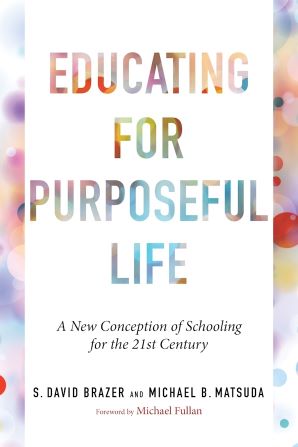California's Anaheim Union High School District developed a framework to remove obstacles hindering students' achievement and support educators' commitment as "promise keepers." With an insightful accounting of the district's undertaking, 'Educating for Purposeful Life' is a recommended read for anyone seeking to build a bridge between 21st century learning and a successful transition into life beyond high school, writes reviewer Michael Hayes.
September 15, 2025
 PHOTO COURTESY OF HARVARD EDUCATION PRESS
PHOTO COURTESY OF HARVARD EDUCATION PRESS
In Educating for Purposeful Life: A New Conception of Schooling for the 21st Century, authors S. David Brazer and Michael B. Matsuda offer insight from the perspective of K-12 practitioners and district leaders. The purpose of the book (Harvard Education Press) is to identify specific systemic issues within a school district and present practical concepts to effect change. The authors aim to provide a reasonable guide for implementation so that students and all stakeholders can experience an equitable, conducive learning environment.
The book delivers an engaging story about an extensive multiyear change initiative in California’s Anaheim Union High School District (AUHSD), while also sharing key insights from the authors, experienced in-service educators. Matsuda has served as AUHSD superintendent since 2014. Within the district, 74% of the 28,000 students are identified as economically disadvantaged. Because the local goal is for all students to “graduate with purpose and particular career pathways,” the need for education reform was clear. Brazer and Matsuda identify systemic problems and offer practical solutions to foster meaningful change.
The text details the district’s implementation process of the “Career Preparedness Systems Framework.” The authors demonstrate how the framework evolved into an effective tool for removing obstacles hindering the educational advancement of students and and for fostering the efforts of Anaheim educators to remain committed to their roles as “promise keepers.” The narrative presents a convincing argument for how the development and refinement of the district’s programming offers clear guidance for other district leaders seeking to revitalize schools.
Among the reforms discussed by Brazer and Matsuda is reimagining high school career and technical education (CTE). The goal is to motivate students to enter the workforce and pursue vocations that would be viable options for the near future. Another reform effort is learning beyond the school campus. Through partnerships with institutions of higher learning, students participate in dual enrollment, often gaining mentorships and internships with potential employers. The book examines how these reforms are implemented and their immediate effects.
Beginning with a historical account of the school district’s journey, the authors highlight the correlation between fundamental issues prior to introducing solutions. Using visual aids, chapter summaries, and topical questions, Brazer and Matsuda enhance understanding while fostering a deeper connection with the content. The Career Preparedness Systems Framework program-driven reform approach demonstrates how vital it is to give educators effective strategies to empower the students they serve.
Educating for Purposeful Life effectively links districtwide educational goals and school-level implementation. Brazer and Matsuda’s insights and practical recommendations offer a valuable resource for anyone committed to improving education in the 21st century. Simultaneously, the book guides teachers who want practical methods to support their students, as it places great importance on helping students create meaningful lives. The combined emphasis of broad concepts of educational reform and pathways to student empowerment makes Educating for Purposeful Life a recommended read for anyone who seeks to build a bridge between 21st century learning and successful transition into life beyond high school.
Michael Hayes (mhayes54@charlotte.edu) is a doctoral student at The University of North Carolina at Charlotte.